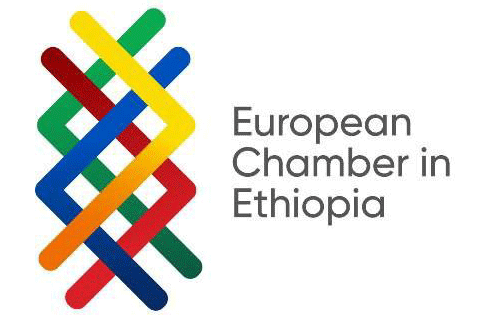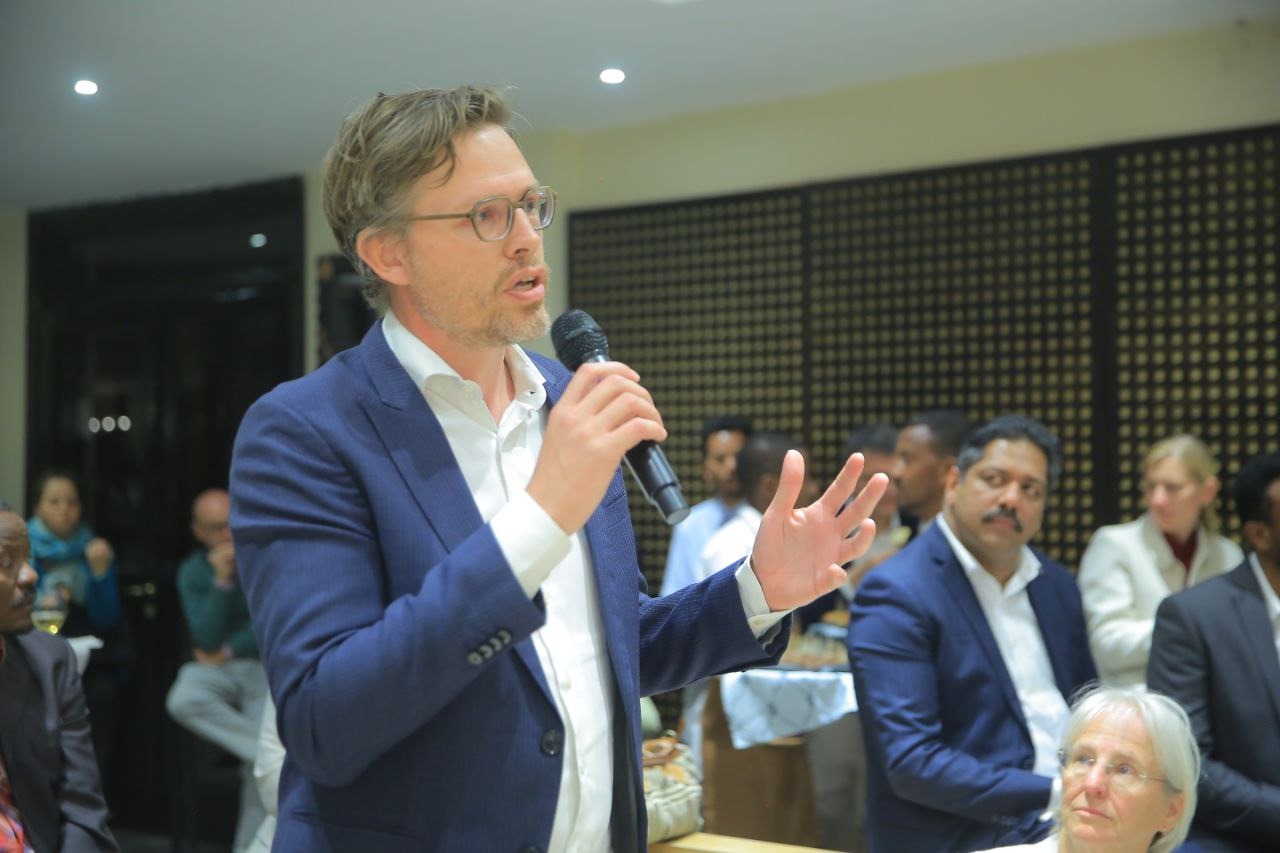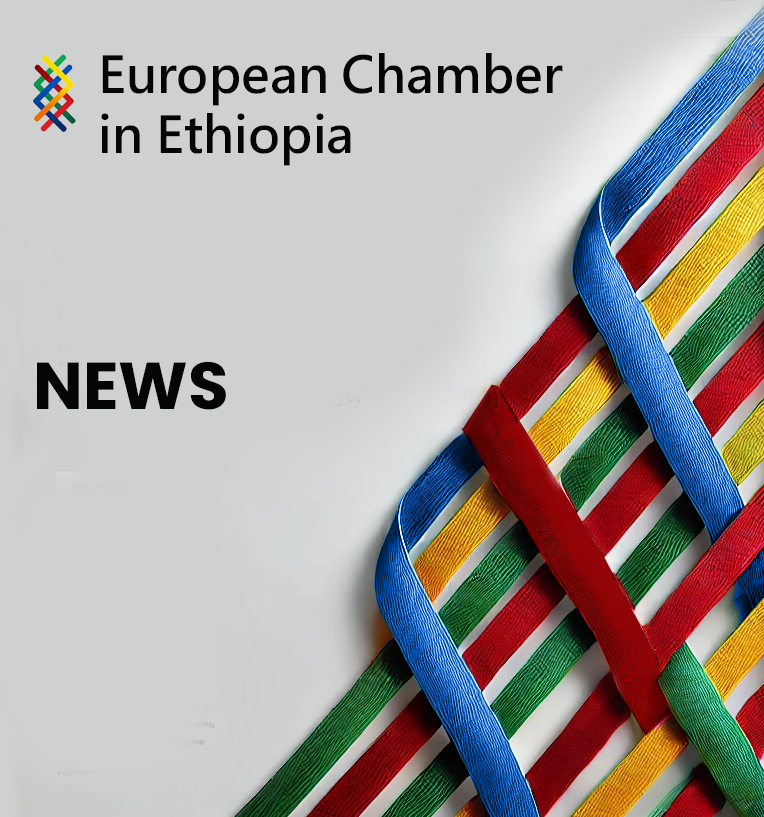EUD Quarterly Economic and Trade Report, October 2024
The European Union Delegation to Ethiopia’s Quarterly economic and trade report for the Fall 2024 summarizing the crucial economic changes experienced in Ethiopia.
Revolutionizing State-Owned Enterprises: EIH Unveils Bold New Business Model
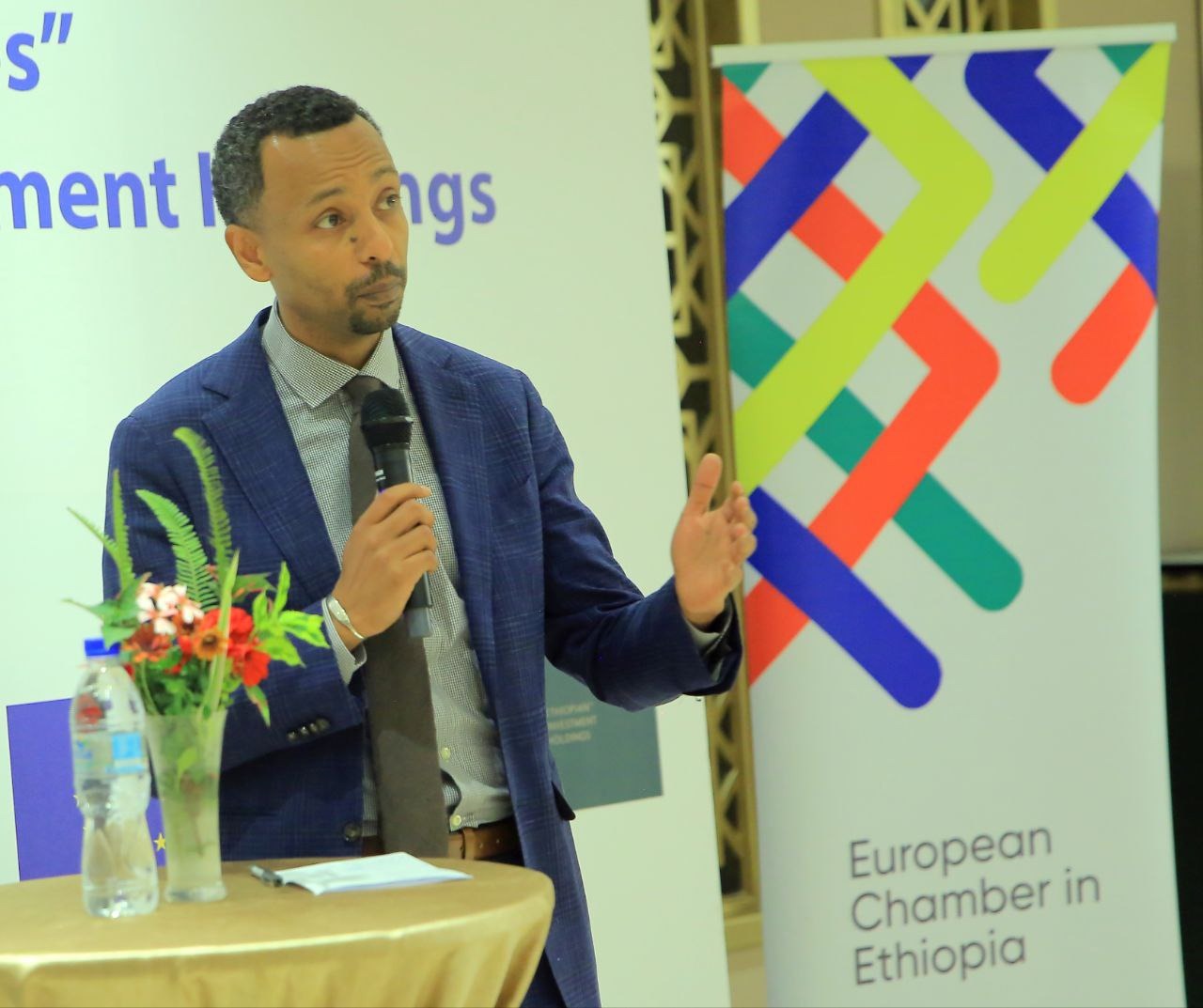
Revolutionizing State-Owned Enterprises: EIH Unveils Bold New Business Model
Ethiopian Investment Holdings’ CEO speaks of redefining the role of state-owned enterprises, setting clear performance metrics, emphasizing innovation and diversification, and fostering partnerships to reduce risks for investors.
“We aim to be a reliable de-risking partner for investors entering the Ethiopian market. This involves taking full responsibility for managing the regulatory aspects of business operations, including land-related matters. Our goal is to allow investors to focus entirely on the business side of their ventures,” Dr. Brook Taye, Chief Executive Officer of the Ethiopian Investment Holdings.
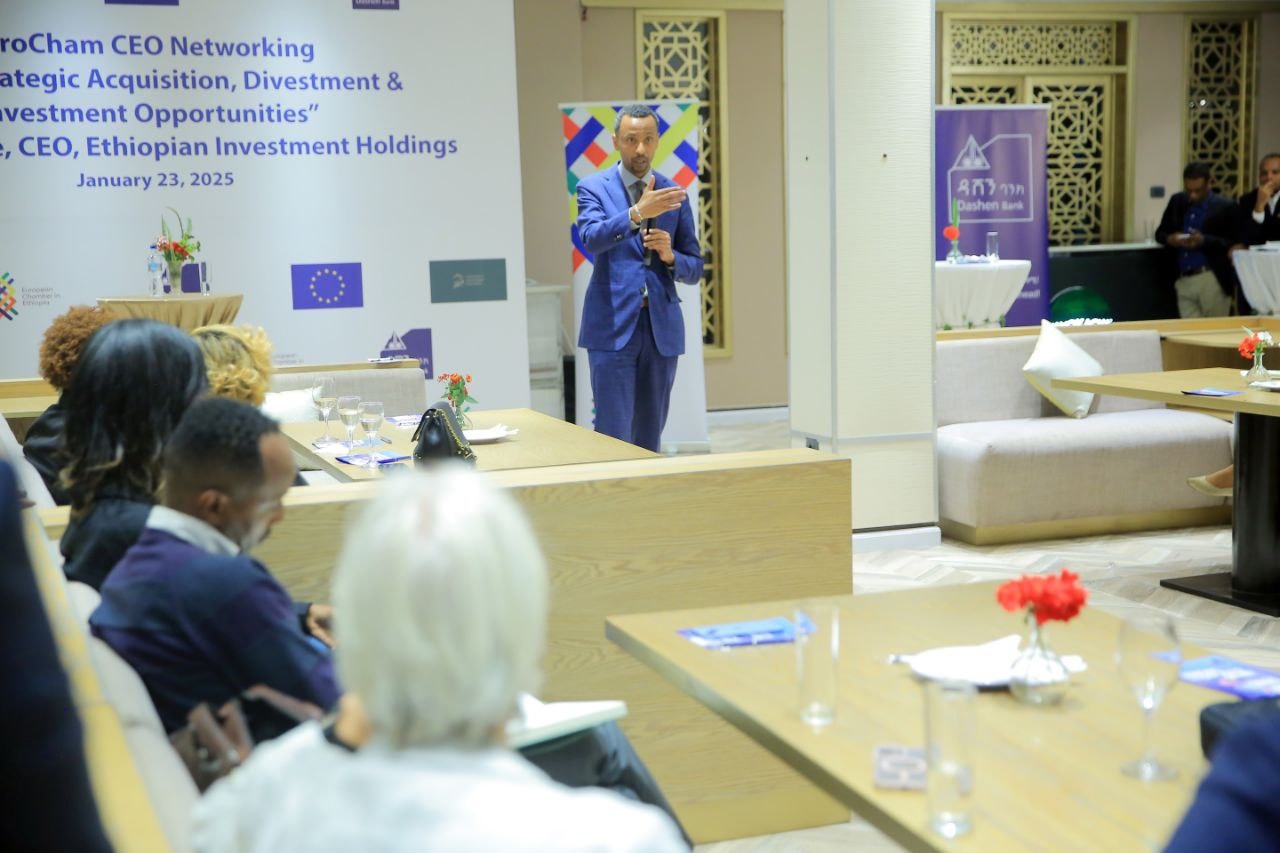
Dr. Brook Taye, Chief Executive Officer of Ethiopian Investment Holdings (EIH), spoke at the European Chamber in Ethiopia’s CEO networking event on 23 January 2025, providing valuable insights into the role of EIH in Ethiopia’s economic development. As the country’s sovereign fund, EIH serves as the strategic investment arm of the Government of Ethiopia, overseeing and managing the nation’s state-owned enterprises. These include full ownership of state-owned enterprises such as Ethiopian Airlines, the Commercial Bank of Ethiopia, Ethio Telecom, the Ethiopian Insurance Corporation, Ethiopian Shipping Lines as well as minority stakes in joint ventures such as EIH having a 30% stake in AMCE, among others. EIH manages 14 portfolio subsidiaries on behalf of the government and holds six investments in its portfolio, with two more in the pipeline – the Ethiopian Securities Exchange and Toppan Gravity.
Dr Brook explained that, while several entities have historically managed state-owned enterprises in Ethiopia, what sets EIH apart is its role as an active owner. Unlike regulators, supervisors, or authorities overseeing the activities of entities, EIH positions itself as a hands-on investor and owner, actively engaging in the enterprises it manages.
The CEO emphasized that when dealing with underperforming companies, EIH adopts a proactive and constructive approach. Instead of waiting for board decisions or relying on guidance from other government entities, the organization takes the initiative to implement the necessary changes. This includes appointing new leadership, developing improved management strategies, and fostering conditions that drive better performance. “We set key performance indicators (KPIs) for all our state-owned enterprises and hold them to a standard of excellence,” Dr. Brook stated. “These KPIs naturally vary by sector, but the most critical common denominator is revenue. We review performance every quarter and adjust as needed if the strategy is not being executed effectively.”
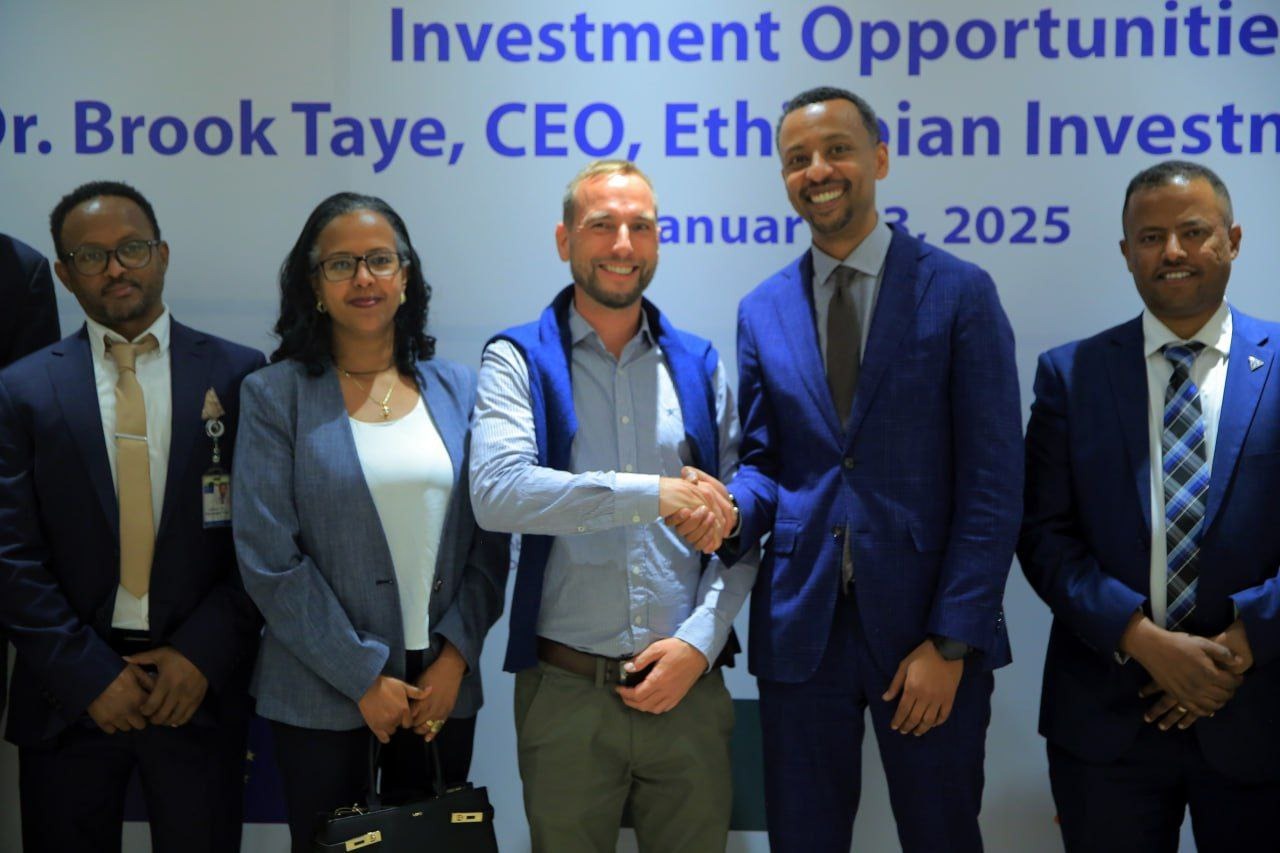
From an investment standpoint, the CEO highlighted that EIH adopts a distinctive and forward-thinking approach, viewing investments and investors entering Ethiopia through a unique and progressive perspective. “We aim to be a reliable de-risking partner for investors entering the Ethiopian market. This involves taking full responsibility for managing the regulatory aspects of business operations, including land-related matters. Our goal is to allow investors to focus entirely on the business side of their ventures,” he said.
A recent review of EIH’s land assets showed that, by acreage, the holdings would make it the 30th smallest country in the world. This vast land ownership allows EIH to simplify the investment process for potential investors. “If an investor seeks 3,000 hectares of land for a project for instance, they no longer need to navigate various regions to find suitable land with the right agro-climatic conditions. Instead, EIH utilizes its comprehensive database to input specific parameters, identify the appropriate land, and ensure the investor can focus entirely on launching their business,” he noted. The CEO explained that EIH does not only contribute in-kind, but also invests equity. This structure allows EIH to support investors who typically bring in foreign exchange, while EIH handles the birr component, utilizing its own capital. The CEO emphasized that this is not debt financing, but rather equity investment.
EIH collects dividends from its 40 companies and contributes to Ethiopia’s national budget. “This year alone, we paid 5.3 billion birr in the first quarter. We are expected to contribute a total of 14 billion birr to the national budget, and whatever remains becomes our investment capital. We deploy this capital to ensure that companies entering the market have no difficulty accessing investment capital,” the CEO said. “We aim to be a de-risking partner for investors — whether through in-kind contributions or equity investments, we are here to support them when they seek investment,” the CEO assured European investors.
The CEO observed that for most companies entering Ethiopia, the biggest challenge is navigating the local legal landscape. Issues such as customs and interactions with various institutions often arise. However, with EIH’s strong board structure – comprising key figures such as H.E. the Prime Minister of Ethiopia, Dr. Abiy Ahmed, the Finance Minister, the State Minister of Finance, and other influential leaders in the government’s economic sector – Dr Brook reflected that issues are swiftly addressed.
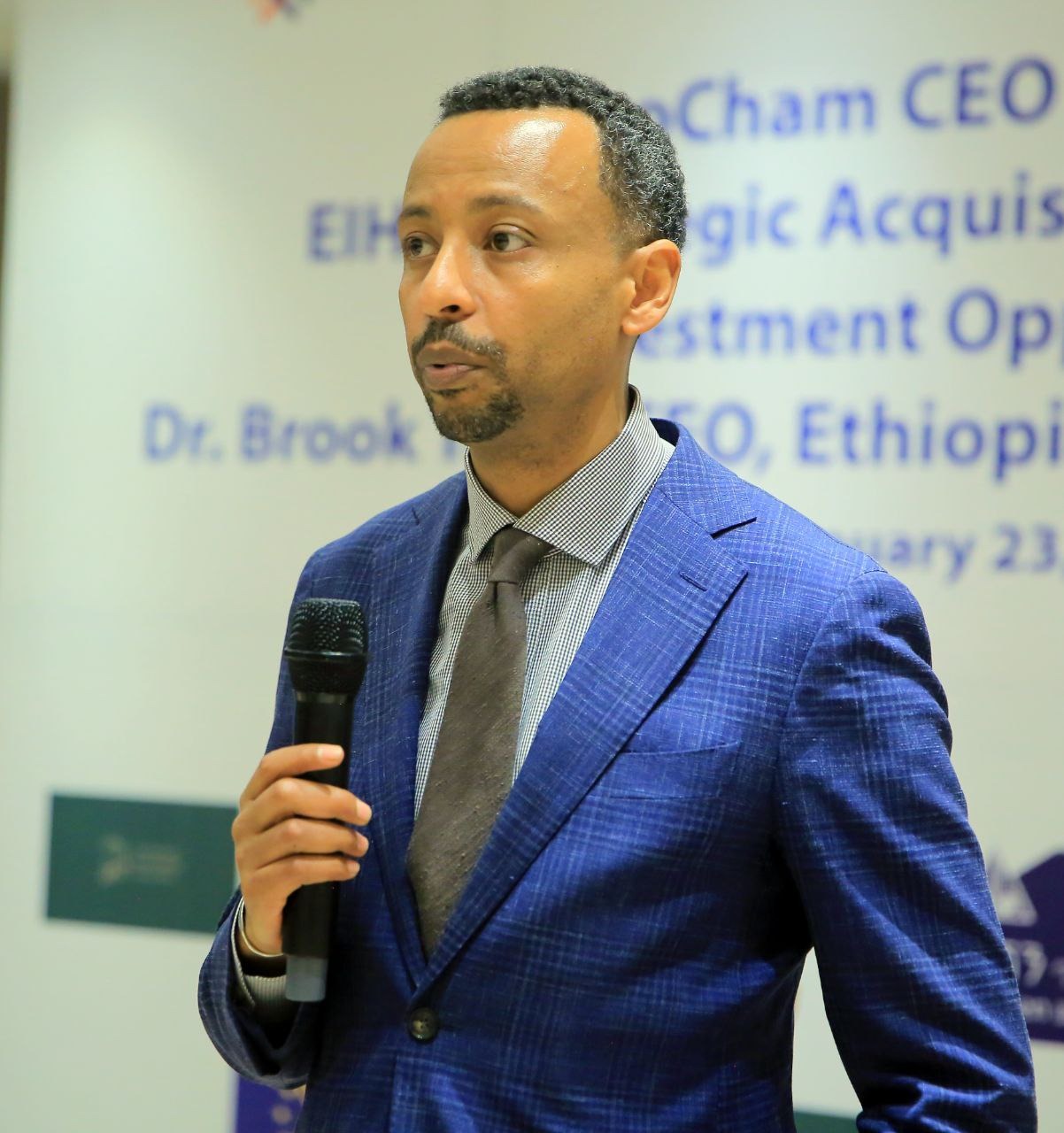
According to the CEO, EIH has had a successful second quarter, marking a strong performance over the last six months. “EIH’s total revenue over the past six months amounts to 901 billion birr. We have generated nearly 5.1 billion dollars. We contributed almost 20 percent of the total taxes collected during this period. This performance reflects the results of our companies, driven by our active role as investors and owners, consistently pushing for excellence in performance,” he noted.
EIH has introduced a new strategy for its 40 companies, addressing legacy issues while focusing on the future. The five-year strategy centers around three key pillars – diversification, innovation, and public contribution. The first pillar emphasizes diversification in geography, services, products, and sectors. The second pillar encourages driving innovation and improving service delivery. The third pillar focuses on delivering value to the Ethiopian public through increased dividends, higher tax payments as revenue grows from diversification, and enhanced foreign exchange generation through expanded operations. The CEO highlighted that investment is at the core of EIH’s diversification and delivery strategy for the next five years, with opportunities for foreign investors to get involved.
The CEO provided an update on Ethio Telecom, noting that 10% of its equity is currently being sold, with the transaction period extended for another two weeks until mid-February. He emphasized that, for investors, more promising opportunities lie in what comes next. “Privatization is not EIH’s primary focus. Instead, the main priority is the reform of state-owned enterprises. As part of this reform, divestment will take place in certain areas. For example, the government has decided to divest 100% of the sugar estates, which are actively seeking investors. Meanwhile, companies such as the insurance, shipping, and printing firms are exploring the possibility of listing on the stock exchange,” he reflected.
The CEO also mentioned that the sugar estates are undergoing transformation, with even the older estates producing significant sugar for the local market. As part of the divestment strategy, all sugar estates are open for discussion with potential investors. He noted that foreign investors will be permitted to participate in the exchange market, with a quota of up to 30%. The capital market and the national bank are developing the necessary tools to facilitate foreign investment on the exchange.
The CEO expressed that EIH would be pleased to host discussions with investors on various aspects of the country and the policy issues at hand. As a commercial entity, he said EIH and its companies are focused on addressing key commercial concerns. “EIH is working to introduce a creative way of reducing the touchpoints of many logistics-related binding constraints using Ethiopian Shipping and Logistics and IPDC through the special economic zones. We plan to introduce this initiative in the next six months with a new working procedure.”
The CEO responded to questions raised by the business community during the event, which was attended by members of the European Chamber in Ethiopia, as well as representatives from the diplomatic community.
latest News
Is a Salary Raise the Answer to Rising Inflation?
October 22, 2024
The FX Regime Change in Ethiopia & Its Broader Implications
October 22, 2024
An Online Portal for Ethiopia's Tax Laws and Regulations
The Ethiopian Ministry of Finance has launched an online portal designed to provide citizens and businesses with streamlined access to the country’s tax laws and regulations. The platform, hosted on the Ministry’s official website, offers a centralized repository of tax-related information, including proclamations, directives, and procedural guidelines. This initiative aims to enhance transparency, simplify compliance, and support taxpayers in navigating Ethiopia’s legal tax framework. Use the following link to access the online portal.
Ethiopia’s Macroeconomic Reset Sparks Record Foreign Exchange Inflows

Ethiopia’s Macroeconomic Reset Sparks Record Foreign Exchange Inflows
Speaking to members of the European Chamber in Ethiopia, the Governor of the National Bank of Ethiopia highlights the Central Bank’s ongoing efforts to restructure its operations, prioritizing inflation management and preparing to open the banking sector to foreign competition.
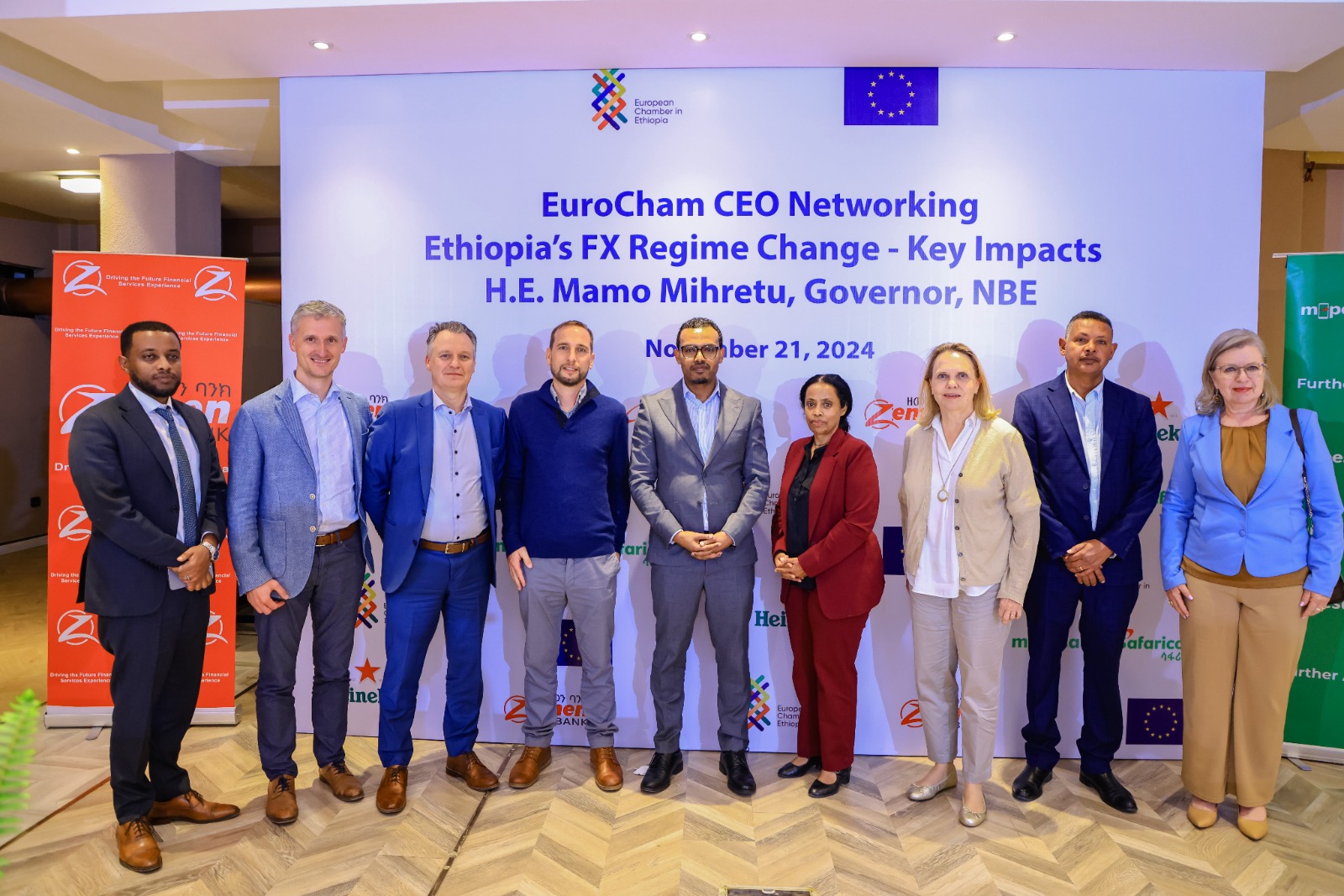
“The reform has doubled the FX reserves in Ethiopia’s banking system from US$ 3.1 billion to US$ 5.9 billion,” H.E. Mamo Mihretu, Governor of the National Bank of Ethiopia.
The European Chamber in Ethiopia (EuroCham) hosted H.E. Mamo Mihretu, Governor of the National Bank of Ethiopia, in its monthly CEO networking event that took place on 21 November 2024. In his opening remarks, Ben Depraetere, Board Chair of the European Chamber in Ethiopia, noted that the chamber represents over 185 members from the European FDI community who have invested in Ethiopia. “Some of our members are among the top five taxpayers in Ethiopia, our companies create thousands of jobs, substantially contribute to foreign currency generation and contribute to the government’s tax collection targets,” he said. “We also count some of the largest global coffee buyers among our members, with one of them buying 10% of the global coffee volume. These European companies are very important for Ethiopia’s coffee sector and economy as a whole.” The Board Chair reflected on EuroCham’s commitment to collaborate with NBE and government Ministries to improve the business climate in Ethiopia, referring to four policy briefs that have been launched by the Chamber focusing on persistent business impediments including FX, customs, tax and access to land. He noted that most of the findings and recommendations in the policy brief on FX have been addressed in the recent NBE directive on FX reforms.
H.E. Mamo Mihretu, Governor of the National Bank of Ethiopia, commenced his address by acknowledging the investment and value addition of European businesses to Ethiopia’s economy. “The interest and participation of the private sector in Ethiopia’s economy, particularly that of European businesses is absolutely critical to grow and make Ethiopia’s economy more competitive,” he said, while appreciating the business community’s continued partnership despite ongoing challenges.
The Governor’s address revolved around three main pillars: (1) a review of recent macroeconomic reforms; (2) an assessment of some of the early results; and (3) an outline of the Central Bank’s forthcoming strategic initiatives.
In July 2024, Ethiopia transitioned to an interest-based monetary policy framework for the first time in its history, aiming to achieve price stability. This reform was built upon earlier measures taken in August 2023 to contain excessive monetary growth and set an explicit inflation objective. Reflecting on the Central Bank’s historic reforms, which were described as comprehensive and well-coordinated, the Governor emphasized that these changes in the monetary regime were as important as the FX regime change that followed. “This is a reform that we take immense pride in as it modernized Ethiopia’s monetary framework and refocused the National Bank’s core task towards controlling inflation,” said the Governor.
The second set of reforms launched over the past year aim to strengthen Ethiopia’s financial sector by encouraging growth, innovation and competition. A key objective is a financial sector that is much more accessible to all segments of society, which will be possible with the entry of new players such as fintechs as well as the use of digital channels and platforms. For the first time, the sector is opening to foreign competition, with legislation currently under parliamentary review and set for enactment next month.
The Governor stated the third reform, transitioning to a market-determined exchange rate, followed extensive internal discussions and preparations. Both the central bank and the broader Government macroeconomic team prepared extensive measures to mitigate any adverse impacts from this reform. He explained that the central bank consolidated nearly 87 directives and regulations into a single, clear and accessible FX regime change directive. The reform is both a policy and regulatory overhaul, streamlining burdensome directives into a single FX policy. It removes the FX surrender requirement, allows exporters to retain 50% of their FX earnings indefinitely and gives banks and exporters the flexibility to negotiate rates. It also lifts import restrictions, opens FX bureaus for small transactions and marks a radical shift from a five-decade old FX policy, with coordinated and interrelated reforms.
The Governor stated that the reform’s immediate impact includes a sharp reduction in the parallel market premium, which fell from nearly 100% to near 5%. “Remitters sending money from abroad now receive bank rates that are as competitive as that offered by Hawala companies. Additionally, FX transaction volumes have surged, with banks purchasing an average of US$ 500 million per month and selling an average of US$ 700 million per month over the past quarter. The reform has doubled the FX reserves in Ethiopia’s banking system from US$ 3.1 billion to US$ 5.9 billion,” he said. With gold proceeds and rising exports, reserves are expected to continue growing. The private banking sector has also largely cleared its previous US$ 500 million net FX liability, ensuring importers’ FX needs are met. Additionally, an interbank FX market is becoming active, with close to US$ 100 million transacted so far – making it possible for banks with surplus FX funds to sell it to those with a shortage of FX funds.
In general, FX inflows in Ethiopia have surged, with some banks’ receipts up over 100%, as intended by the reform. While challenges remain, the trend suggests importers will gradually find it easier to secure foreign currency. “The balance of payments has also been improving; for example, our current account balance, instead of being in deficit as it has been for many years, has turned into a surplus in the first quarter of the fiscal year,” the Governor said. Additionally, companies can now repatriate profits and income from Ethiopia following the exchange rate reform.
Looking ahead, the central bank will remain focused on price stability and financial sector stability, maintaining a tight monetary policy until inflation is under control. While tight monetary measures may temporarily limit credit to the private sector, the Governor noted it is essential to avoid an inflationary spiral. “Our expectation is that inflation will be on a gradually declining trend over the course of 2025,” noted the Governor. The National Bank will also prioritize modernizing Ethiopia’s banking sector, supported by new legislation and improvements in operations and customer service. Consumer protection, transparency, and communication will be enhanced. Lastly, the central bank itself will undergo modernization, with a new proclamation strengthening its autonomy, credibility, and alignment with international standards such as Basel.
“The reforms are an important and transformative reset to the Ethiopian economy in a manner that would increase the participation of the private sector, encourage and support investment and export and recalibrate the way economic policy making is happening in Ethiopia. The result we have seen so far has been tremendously positive and encouraging. For us to succeed in our goal of ensuring price stability, fiscal stability and rising investment, we need the support and collaboration of everyone,” said the Governor.
The Governor responded to questions raised from members of EuroCham, who hailed the reforms as a basis for a sustainable economy. While access to FX has improved significantly, investors said the crunch has now shifted towards local currency liquidity. Questions posed to the Governor centred on the continuation of Franco Valuta imports for FDI and companies in the manufacturing sector, businesses affected by the current reforms, the impact of tightening monetary conditions on economic activities, financial inclusion and the Dire Dawa Free Trade Zone, among other topics.
In his response, the Governor highlighted that the central bank sequenced the monetary policy reform to protect low-income households, learning from other countries’ experiences. While the reform impacted the central bank’s balance sheet and government debt, the Governor said it was necessary to replace an unsustainable system that constrained development. He mentioned that support is being provided to affected businesses, including the provision of working capital loans. The Governor stated that Franco Valuta is restricted for merchandise traders and wholesalers but allowed—as before—for manufacturing investors.
Speaking of the Dire Dawa Free Trade Zone, it was clarified that it is designated as a customs territory outside of Ethiopia and imports and exports to and from the zone will be treated accordingly. The central bank is developing specific banking regulations tailored for operations within the Free Trade Zone.
The Governor reflected that Ethiopia’s formal banking sector serves fewer than 300,000 borrowers, highlighting the need for broader financial inclusion. The central bank is working with fintech and banks to advance digital financial credit and promote wider access to credit and investment. In the anticipated entry of foreign banks into Ethiopia’s banking sector, the governor said, “Opening the financial sector does not mean deregulation. The sector will remain regulated while being opened in a way that benefits the entire financial system, not individual banks. For instance, foreign banks will be encouraged to collaborate with local banks to enhance capacity, innovation, and skills.” The new banking proclamation includes detailed provisions for managing anticipated problems, outlining step-by-step procedures for the central bank to address unforeseen issues in the financial sector. According to the Governor, these measures will be applied judiciously.
EuroCham’s monthly CEO networking event was organized in collaboration with Zemen Bank, Safaricom Ethiopia and Heineken Ethiopia. Reflecting on the Governor’s remarks, a representative of Zemen Bank, which has 130 branches across Ethiopia, said, “Previously, we used to surrender up to US$ 200 million annually to the NBE but with the surrender requirement now removed, we are reallocating it into the private sector. FX is now relatively more available, and we are able to issue LCs to our clients.”
Safaricom Ethiopia’s CEO shared, “We have invested US$ 2.6 billion in Ethiopia and currently have about 3,000 telecom sites operational, with another 1,000 under construction. This allows us to reach 60% of the Ethiopian population, approximately 70 million people, providing access to 4G mobile broadband services—a milestone achieved by few African countries.”
Heineken Ethiopia’s CEO added, “Existing FDIs face unique challenges under these reforms, as international companies often rely on foreign currency funding from their parent companies. The reforms can push such businesses into negative equity.” The use of a foreign currency-to-local currency loan swap was suggested as a potential solution in this area.
EuroCham’s monthly CEO networking event was attended by H.E. Sofie From-Emmesberger, Ambassador of the European Union to Ethiopia, members of the diplomatic community and members of the European business community in Ethiopia.
In conclusion, EuroCham commended H.E. Mamo Mihretu, Governor of NBE and his team for the transparency, communication and engagement with the FDI community. EuroCham and NBE agreed to continue the constructive collaboration through the technical committee established with representatives of both sides, chaired by the Governor.

latest News
Is a Salary Raise the Answer to Rising Inflation?
October 22, 2024
The FX Regime Change in Ethiopia & Its Broader Implications
October 22, 2024
Is a Salary Raise the Answer to Rising Inflation?

Is a Salary Raise the Answer to Rising Inflation?
European Chamber in Ethiopia’s latest CEO networking event explores solutions on managing salary adjustments amid rising inflation post-FX regime change.

Against the backdrop of Ethiopia introducing a competitive and market-based determination of foreign currency exchange rates on July 29, 2024, employers have been pondering the impact the reform would have on salaries. In its latest monthly CEO networking event that took place on October 10, 2024, the European Chamber in Ethiopia, hosted Ruth Yohannes, Founder & General Manager of The Talent Firm and Takele Dibekulu, Deputy Chief of Human Capital at Zemen Bank to lead a discussion on ‘Managing Salary Increases Amid Rising Inflation Post-FX Regime Change’. With the caveat that it has been a mere two months since the introduction of the FOREX regime change and hence the lack of substantial information for impact analysis, the HR Experts refrained from encouraging employers on making immediate salary increases – implying that monthly inflation and FX change would drive perpetual salary adjustments that are not sustainable. They rather emphasized the need for a wholistic approach that takes macro level factors into account to respond to market inflation. This includes the consideration of various factors beyond FX that would impact the labor market dynamics, which would alter the status quo on salary deals and compensations in general. The approach is centered on retaining human resource, promoting their well-being and providing support through these uncertain times.
According to the experts, the current reforms force employers to forgo the otherwise standard practice of using international salary and compensation benchmarks from the likes of Berks Group and Mercer, as well as the International Monetary Fund (IMF) and the World Bank for inflation rates, to make a cost-of-living adjustment across salary scales. The change in the labor market calls for HR professionals to practice the profession in full-fledged terms beyond hiring, firing and making salary changes. An increase in Foreign Direct Investment (FDI) with the entry of multinationals into the market will prompt a higher demand for talent, making those that have been trained on European business models more prone to employee poaching. For this reason, salary adjustments are not recommended as a sustainable solution. The anticipated launch of the capital market introduces another dynamic to the labor market, as local companies consider mergers and acquisitions and listing shares on the stock market. According to the HR experts, this would entice qualified talent to seek employment at companies that are preparing for an initial public offering (IPO). This would eventually result in a change of compensation structures that would lead to providing shareholding opportunities to employees rather than salary adjustments. In the discussion that followed their presentation, the experts recommended ongoing monitoring of the labor market to make decisions on employee compensations.

HR professionals were advised to monitor trends in the market with sector specific nuances, through assessments of changes being implemented by different organizations. For employees earning foreign currencies, employers should consider providing financial planning and personal budget management lessons to mitigate the impact of fluctuating exchange rates. For those paid in local currency, case-by-case assessments may be necessary to determine appropriate adjustments. Firms that currently make cost of living adjustments annually or bi-annually should explore more frequent evaluations, to monitor market conditions and identify potential adjustment needs without necessarily implementing immediate changes.
When considering salary adjustments, it’s beneficial to adopt a total rewards perspective, according to the HR Experts. This involves examining the broader compensation package, including allowances for fuel and housing. For employees whose salaries are denominated in Ethiopian Birr, adjustments may be necessary, especially if the last review was conducted in the distant past.
It was highlighted that certain employee groups may be disproportionately affected by ongoing inflation. While making decisions, its crucial to consider the diverse categories of employees. For high-income earners or those in top tier positions, it might be prudent to monitor developments before making immediate adjustments.
While Ethiopia doesn’t have a formal minimum wage policy, industries often establish benchmarks to stay competitive in terms of the payment that they offer to their employees. Information on food inflation is available at the monthly data shared by the statistical agency information is more relevant. For low-income earners, the government’s salary increase for the lowest earners in the government structure can serve as a benchmark.
Discussions reflected that the global practice has historically been to provide partial inflation compensation, typically ranging from 70-80%. While this approach was manageable in the short term, the cumulative impact of several years of high inflation has significantly eroded purchasing power for many. To address this, employers were advised to re-evaluate their compensation strategies.
The CEO networking event was attended by members of the European Chamber in Ethiopia and featured a remark by the newly appointed EU Ambassador to Ethiopia, Her Excellency, Sofie From-Emmesberg.
latest News
Is a Salary Raise the Answer to Rising Inflation?
October 22, 2024
The FX Regime Change in Ethiopia & Its Broader Implications
October 22, 2024
The FX Regime Change in Ethiopia & Its Broader Implications

The FX Regime Change in Ethiopia & Its Broader Implications
On July 29, 2024, the International Monetary Fund (IMF) announced a new Extended Credit Facility program that would support Ethiopia in alleviating foreign exchange shortages during the country’s transition to a market-based exchange rate. The program aims to boost exports, stimulate investment and attract more foreign direct investment. One of the topics of the European Chamber in Ethiopia’s monthly CEO networking event that was held on October 10, 2024, focused on ‘The FX Regime Change in Ethiopia & Its Broader Implications’, with a presentation by Rasmussen Tobias, IMF Resident Representative to Ethiopia.
European Chamber in Ethiopia’s latest CEO networking event discusses the IMF’s four-year Extended Credit Facility program that aim to support Ethiopia’s transition to a market based foreign exchange rate.

The IMF representative stated that the Extended Credit Facility program is part of the IMF’s concessional lending facilities for low-income countries, which is an interest free loan. The four-year program, with a total financing of 3.4 billion dollars, is part of the IMF’s support to Ethiopia’s Homegrown Economic Reform Plan. A billion dollar was dispersed immediately after approval and the remaining part will be dispersed in tranches over four years following program reviews that will be conducted periodically to assess the country’s progress in meeting the reform targets. The Extended Credit Facility is part of a broader support program, totalling $10.7 billion, which has been split roughly three ways with the IMF, the World Bank and creditors.
IMF had a similar program in late 2019, which wasn’t successful for different factors including the COVID-19 pandemic and local conflict in Ethiopia. Following the peace agreement in late 2022, there was renewed focus on economic and macroeconomic reforms, culminating in the recent release of the second version of the plan.
The program has five primary objectives. The first is to address the foreign exchange challenges, particularly the pressure on the balance of payments caused by the exchange rate disparity. There was a significant gap between the official and parallel market exchange rates. The goal was to transition to a more market-oriented exchange rate system, reducing the discrepancy between official and parallel market rates.
The program’s second objective is to assist the government in modernizing its monetary policy framework through support to the central bank. The third objective is to enhance government revenues through improved tax collection. The IMF representative noted a significant decline in tax revenue as a share of GDP. Last year, Ethiopia’s tax revenue stood below 7% of GDP, well below international standards. The program aims to increase this ratio by 4 percentage points over four years. To achieve this, Ethiopia recently published a medium-term revenue strategy focusing on enhancing tax administration, broadening the tax base, eliminating loopholes and removing exemptions to help improve revenue.

In its fourth objective, the program focuses on supporting the reform of state-owned enterprises with a focus on financial aspects. Significant progress has been made in reducing the borrowing of state-owned enterprises, strengthening their management through oversight systems, particularly at Ethiopian Investment Holdings, and converting some of these loans into government debt to improve the balance sheet of the Commercial Bank of Ethiopia.
The foreign exchange reform has led to economic changes, such as increased fuel prices due to the depreciation of the exchange rate. To mitigate the impact on vulnerable households, the program’s fifth objective emphasizes the allocation of funds for subsidies to phase in price increases gradually and expand funding for the Productive Social Safety Net Program (PSNP). The program also aims to enhance transparency and public financial management to modernize Ethiopia’s fiscal practices.
The IMF representative mentioned that the past ten weeks have witnessed remarkable progress with Ethiopia’s historic exchange rate reform successfully narrowing the gap between the official and parallel market rates. This transition, often characterized by volatility in other countries, has been remarkably smooth. He said inflationary pressures have been less severe than anticipated. August’s inflation rate continued to decline from 19% in July to 17% in August. While some prices have risen, the overall transition to a market-based exchange rate has been smooth and successful. However, the representative acknowledged the presence of persistent challenges such as limited foreign exchange access by businesses. Despite these obstacles, significant progress has been made and the four-year program offers ample opportunity for further improvements. In conclusion, the representative stated that the IMF has recently completed an initial review of the program and is encouraged by the progress.
The CEO networking event was attended by members of the European Chamber in Ethiopia and featured a remark by the newly appointed EU Ambassador to Ethiopia, Her Excellency, Sofie From-Emmesberg.
latest News
Is a Salary Raise the Answer to Rising Inflation?
October 22, 2024
The FX Regime Change in Ethiopia & Its Broader Implications
October 22, 2024
European Chamber’s Exclusive interview with H.E. Roland Kobia, Ambassador of the European Union to Ethiopia
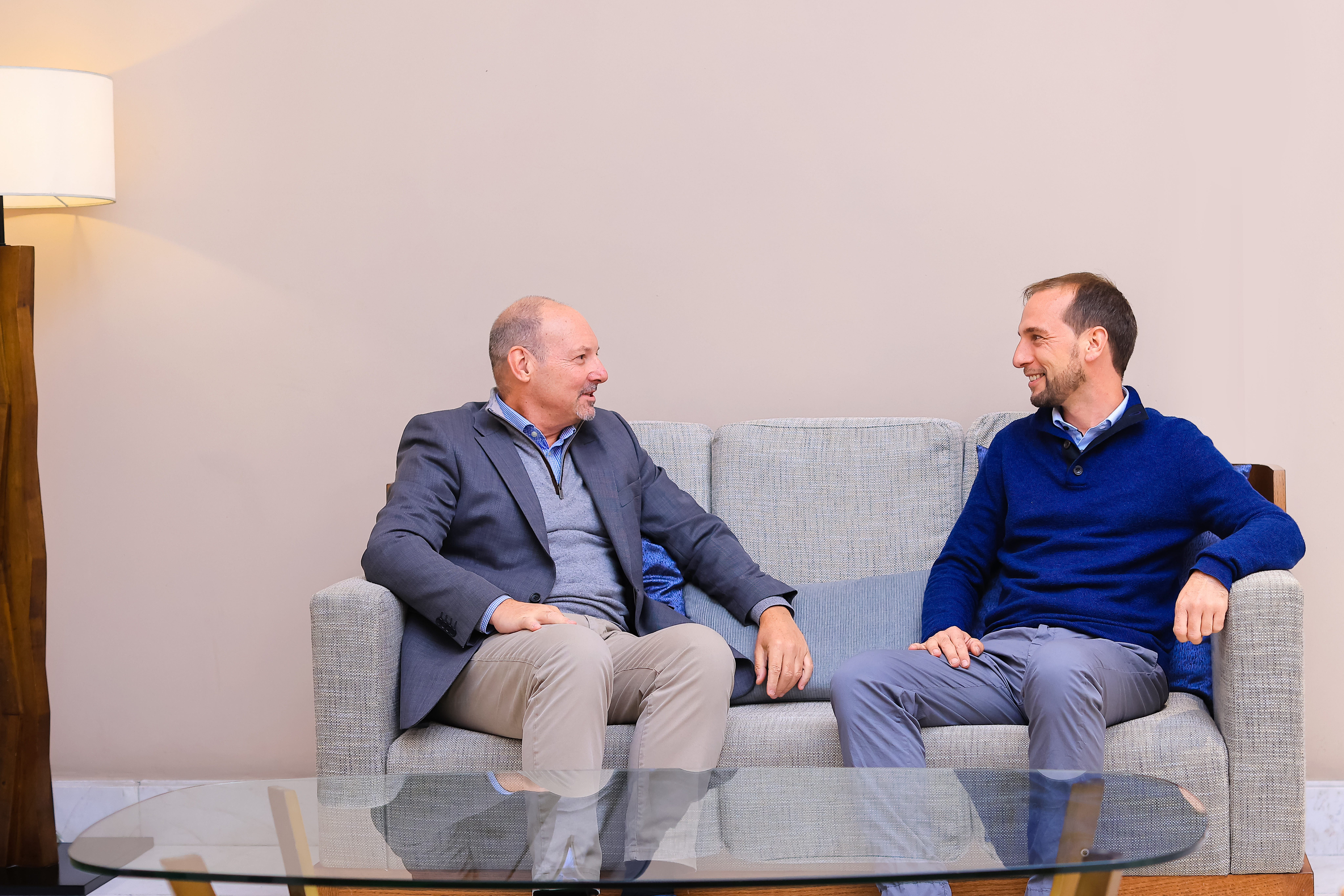
European Chamber’s Exclusive interview with H.E. Roland Kobia, Ambassador of the European Union to Ethiopia
As the outgoing Ambassador of the European Union to Ethiopia, H.E. Roland Kobia, completes his tenure in the country, he had a sit down with the European Chamber in Ethiopia’s Board Chairman Ben Depraetere, discussing a wide range of topics from EU Foreign Direct Investment (FDI) to EuroCham’s role in enhancing the relationship between the EU and Ethiopia.
As you end your mandate in Ethiopia, what are the most significant achievements and challenges you encountered in strengthening the EU-Ethiopia partnership during your tenure, and your memorable moments?
I arrived in Ethiopia – full of enthusiasm and expectations – in September 2021 at a time when the world was slowly seeing the end of the tremendously difficult period of COVID-19 as well as in the immediate aftermath of a global traumatising exit from Afghanistan I was involved in. In Ethiopia, the conflict was raging; disinformation and propaganda were at their peak; there was a lot of suffering. The Ethiopia-EU bilateral relations were also at a decades-long low because of the war and EU’s resolute position in favour of peace. In short – it was a very challenging time indeed to take over the leadership of one of our largest EU Delegations worldwide and be responsible for managing a development co-operation envelope of € 1 billion. Regrettably, in the very first weeks of my arrival, I had to organize the evacuation of all expatriate staff and families, as well as ensure the safety and wellbeing of our local staff– myself staying in Addis Ababa throughout the war, with a handful of dedicated colleagues.
In general, the legacy of the conflict, and the strain that the principled and vocal stance of the EU had on our relations, did certainly influence my time here. I can’t say it was a smooth posting. Nonetheless, with great support of the EU Member States and my team at the EU Delegation, we have worked to keep the bar high on international law principles, while maintaining dialogue. We worked on a new political roadmap for Ethiopia, culminating in the April 2023 Council Conclusions, unanimously approved by all 27 European Foreign Ministers and the EU High Representative. That sent a clear signal to Addis that the EU was open to gradually work on the normalisation of bilateral relations, within the context of progress on justice, peace and humanitarian access. Unfortunately, not everyone in Addis has understood that proposal, and the seriousness thereof, and has measured the importance of the hand we were lending. We could have done much more together if the readiness to re-engage had been reciprocated.
Particularly memorable moments, work-wise, during my time here, were visiting the Tigray Region for the first time with Humanitarian EU Commissioner Lenarcic in June 2022; creating and engaging with the EU-ETH Youth Sounding Board – an invaluable platform for us to discuss our policies and approaches with a diverse group of outstanding young Ethiopians. I was lucky enough to also be able to work as EU Ambassador to the AU for several months, with the great team we have in our EU Delegation to the AU. This was a lot of hard work overseeing two missions at the same time but thanks to the great staff in both, it gave me a unique insight to the workings of an organisation that has been modelled after the EU; also importantly, celebrating the ten-year anniversary of the European Chamber in Ethiopia – EuroCham – in 2022! Trade and people-to-people connections are the real bonds that tie societies together. EU companies do a fantastic job in Ethiopia and show great strength and incredible resilience in managing a number of concomitant challenges. I am also a Professor at the College of Europe – so engaging with energetic students to explain what the EU is all about at various Ethiopian Universities as well as at the UNECA were a great source of inspiration.
How has Ethiopia evolved during your time here? What are the most striking differences between the Ethiopia you arrived in and the Ethiopia you are leaving behind?
Most clearly, and encouragingly – thanks to the agreement – the conflict in the northern part of the country no longer devastates the lives of millions of Ethiopians. It is known that peace is not just the absence of war, it is the creation or re-establishment of a wider sense of humanity. Thus, although guns are by and large silenced in Tigray, other tragic conflicts have replaced it and continue to persist today, particularly in the Oromia and Amhara regions with instability also in peripheral regions. A swift negotiated solution will have to be found and be tailor-made; one-size-fits-all accords never work.
Corruption and the reduction of public / civil society and media space have unfortunately not seen a trend towards improvement. This will be a tricky issue to deal with if not curtailed as soon as possible. It risks undermining an otherwise great Ethiopian culture and global perception – one of the real assets of the country.
On the wider geopolitical scale, I have seen Ethiopia seek to adjust to global shifts and test alternative models. The BRICS membership is the clearest indication of this. Understandably, Ethiopia wants to nurture relations with as many partners and organisations, balancing their acts, hedging their bets and reaping the fruits of multiple partnerships. But, as we have seen with the recently launched economic reform programme, the traditional UN-based IFI system of IMF and WB – which is fully backed by the EU and EU Member States – remains the most reliable and generous partner for the country, with much needed reforms having to be frontloaded in Ethiopia. Ethiopia could not find meaningful financial assistance matching its needs outside these classic channels. I hope reforms, needed under the IMF package, will be frontloaded, showing the real commitment of Ethiopia to move towards a market-oriented economy, more protective of businesses, with major impediments being tackled (corruption, extra-budgetary spending, prioritisation of expenses to pro-poor policies, fiscal transparency…).
I have also sensed an Ethiopia seeking to be more assertive, and “taking the lead”. This is a good thing if placed within the frameworks and clear principles enshrined in the UN and AU charters, which Ethiopia has signed up to, and honour the good practice of outreach and dialogue with sisters and brothers in neighbouring countries. The region needs Ethiopia to lead by ensuring stability internally and « exporting » security in the region. To be accepted as a leader, a country needs to build good and tension-free relations with its neighbours and with the wider international community.

What do you see as the biggest opportunity for Ethiopia in the next decade? What are the key areas where you believe the EU can make the most significant contribution to Ethiopia’s development in the coming years?
I certainly don’t have a crystal ball. But, as briefly alluded in your question, the greatest asset of Ethiopia – on top of significant natural resources (land, water, power, mineral resources) – are its people. Everyone who visits this country notices an ability to work hard, and unparalleled resilience. Yes, Ethiopians want to do things “their own way” and this can be a bit challenging when it goes against normal practices found elsewhere, when international conventions that have been ratified are interpreted and implemented in a very flexible way. If we want to avoid chaos and wars, we humans need common rules and norms to be able to cooperate, to solve differences legally and peacefully. The rule of law and legal certainty are going through hard times, also in Ethiopia. I sincerely hope that in the face of increased opening to a global world and through economic times ahead, the situation can smoothen.
As far as opportunities go – there are many. The 21st century will be the African Century, and Ethiopia as host of the AU and as one of the big diplomatic hubs in Africa will have to be counted in. Of course, maintaining the historic Ethiopian discipline, work ethic and highly enviable “esprit de corps” in a rapidly growing transactional environment will be challenging. The Addis Abeba Corridor Project – visionary but not without short to medium-term drawbacks for finances and the people – does show that when a goal is set, it can be achieved, and hopefully this vigour will pervade other undertakings and endeavours directly favouring the people in need, also in relation to long time partners. A remarkable set of reforms is being re-kindled by the administration – this is much needed, and the administration is to be lauded for taking a new path and breaking with some of the more protectionist approaches of the past. But the fundamental key to making the most of all opportunities is peace. So, I very much hope that the ongoing conflicts will be resolved in a peaceful way – sooner rather than later, and that a truly inclusive National Dialogue process settles a number of thorny issues and sets the course for the future.
As far as an EU (which of course includes EU Member States) contribution is concerned, the Ethiopian Green Legacy is possibly where we can do most. The Green Legacy is similar to our own EU Green Deal. Both work towards a re-thinking of our economies and touch on all aspects of life in Ethiopia and the EU. We have made great strides at home and under the right Rule of law conditions, can contribute tremendously – in particular through the Global Gateway – with our experience and investments.
How would you describe Ethiopia’s progress in building a genuine democracy? What kind of support can the EU offer to Ethiopia using lessons from the EU’s own democratic journey?
The Ethiopian journey towards democracy is not that different from that of the rest of humanity. Ethiopia’s journey has started relatively late – and given that a number of key issues are still contested by some, the journey will have to have its own path, which will probably not be linear. It is not easy, but certainly worthy, as history has proven it, with strong and authoritarian regimes lasting less than democracies. Political regimes are mainly a question of political will by their leaders, so if the leadership really wants democracy in Ethiopia, the country has shown that it can do things when it believes in it.
Key for democracy are an educated / informed electorate (hence the need to focus on education), free and responsible balancing powers (media, civil society…), strong and independent institutions – and of course, most fundamentally, an agreement between the elites in a country that the democratic process is the way they will settle their differences. I see some commitment from a few in the country. The election in 2005 was perhaps a missed opportunity and the recent conflict has changed dynamics. If enough commit, it will happen – but not overnight. The EU is already supporting the Human Rights, elections, and other sectors that are vital to secure a level playing field for all. The European Parliament is looking to enhance co-operation with the House of People’s Representatives. We have had varying paths in the EU and EU MS. Many brave people have fought, and even lost their lives, in pursuit of this fragile but wonderful approach. Our experience and thus advice is to stay the course, allow for freedom of expression, free assembly etc – recognising at the same time that a great responsibility falls on all who engage with the process and that all will need to accept compromise, and take on a “negotiator takes all” instead of a “winner takes all” mentality.
What aspects of Ethiopian culture or society have you found particularly compelling in terms of their potential to contribute to global progress and understanding?
I recently visited Mercato in a detailed way. I was amazed to see the social and environmental role of this once infamous Mercato. Besides proving its bad reputation wrong (I met many nice and welcoming people), I was surprised to see the incredible contribution that Mercato provides in terms of recycling everything in every way. If Mercato did not exist, Addis Ababa would be much dirtier, as rubbish would stay in the streets instead of being collected to be reused. Without Mercato, many people would be without jobs, and this would increase insecurity and poverty. I therefore hope Mercato will survive the radical works of the Corridor, and even be protected as a heritage of the city.
One the cultural side – I have to say I have been blown away by Ethiopian music, an art very dear to me. The many varied styles of traditional music, the azmaris, the restaurants with great Ethiopian food and displays of truly original dances from the four corners of the country. And last but not least – Jazz, where freedom and creativity become music. I love Jazz as it is the music that best embodies politics: there can be many variations on a single theme, and there is a lot of improvisation. I have been blessed to meet and listen to some of the great profiles of Ethio Jazz, that truly unique sound and feel – which could only have originated on the back of the range of all the musical components of the country. I hope all Ethiopians, notably authorities, understand that artists and musicians are the best Ethiopian ambassadors abroad, and here locally. Cultural places need to be protected to make Ethiopia shine. So, long live Fendika and the EthioJazz clubs, and many others.
Other highlights for me were to host the 2024 World Jazz Day at the EU Delegation, with the participation of so many great Ethiopian stars, and the tradition of running. As many others, I have marvelled at great Ethiopian results throughout the ages and it has been a real pleasure and honour for me to continue our EU tradition of hosting annual Children’s Running races and collaborating with the sporting greats in doing so.
Given the evolving geopolitical landscape, how do you envision the future of EU-Africa relations?
Today, there is an overwhelming confluence and flux of values and hopes, both in Africa and Europe. The partnerships between our two continents are however, in fact and looking beyond propagandist attempts by some, as strong as ever because our relations are ancient, deep, encompassing, and geographically close. Our societies are integrated to a large degree. The AU is modelled institutionally on the EU but will continue to develop its own purpose and its specific way of doing things. But we share ambitions on joint values in our respective AU and EU Charters – democracy, human rights and the rule of law. Now, we need to walk the talk, and ensure implementation of what was signed, helping each other.
The EU continues its offers on trade as the largest trading bloc in the world, based on transparent and comprehensive agreements, often non-reciprocal and favouring recipient countries. The EU’s highly preferential trade system called “Everything But Arms” (EBA) allows basically all (7200) commodities to be imported into the EU market duty-free and without any quantitative restrictions. That system helps to generate growth and create jobs in Africa. We unfortunately witness a “geo-politicisation of trade”. Figures show that some countries trade less with those that are more geopolitically distant, even if it is not in their long-term interest. We need political maturity to differentiate trade and politics, and to continue partnering on A even if we have a disagreement on B.

During your tenure, how receptive have Ethiopian authorities been to European Union Foreign Direct Investment (FDI)?
Let’s not forget that for any country, trading with the EU is trading with the largest and richest integrated bloc in the world. Few governments come to mind that would not extend a red carpet to European FDIs in their territories, given that they not only symbolize a full-pledge pecuniary commitment that is a direct result of the attractiveness of the local economy, but also supports key areas like employment and economic diversification. Most economies that are currently regarded as emerging or developed owe this, to some extent, to a high degree of FDI at some point in their history. The EU MS, after recovering from World War II, became a leading source of FDI for the world, cementing its strong ties with a large list of countries and regions. In this sense, the outward FDI from the EU to Ethiopia from 2020 to 2022 has remained steady at €1 billion yearly, representing a third of the total FDI this country has obtained in this period.
These figures are a testament of the EU’s private sector commitment with Ethiopia and acknowledgement of the opportunities it presents, because maintaining equal levels of EU FDI, despite the hindrances that many sectors and operators have to go through to conduct their business, is praiseworthy. The new governmental reforms aimed at attracting further FDI by, for instance, lifting restrictions in terms of FX retentions and profit repatriation, represent some of the necessary steps demanded by the investment community to overhaul its involvement in Ethiopia. I sincerely hope that these measures will be accompanied by others in economic and peace resolution terms to enable an FDI boom in the country.
Have you had the opportunity to visit rural areas of Ethiopia? If so, what insights did you gain into the lives of ordinary citizens beyond the statistics, and what do you envision for Ethiopia’s development moving forward?
I have visited all regions of Ethiopia, some on several occasions. I have always been very well received, at the highest level, in all regions. It is easier there to have a real political dialogue. I encourage all diplomats to work more with the regions, Ethiopia is not Addis only.
I have been truly impressed by all Ethiopian women – rural and urban – they are the backbone of the country! In what some might refer to as a society dominated by men, women nonetheless undertake remarkable economic and social roles. It is heart-breaking to see the heavy loads that many women carry on their backs on the roadside. Hopefully, they will soon – one way or the other – get affordable contraptions with wheels so they can either push or pull these loads. Many have commented that it was the Ethiopian women from all corners of the country – and in particular Empress Taitu – who played the really decisive role at the iconic battle of Adwa.
How do you assess the potential of EuroCham in enhancing the relationship between the EU and Ethiopia, and what role do you see it playing in this dynamic?
First, I want to pay a sincere tribute to EuroCham for the extraordinary work they do. I also want to express my admiration for the resilience and courage of European entrepreneurs, working under a climate of unpredictability, legal uncertainty and insecurity, just to mention a few of the problems of an overall unfriendly investment climate they face. I would not be personally able to do what they do.
I perceive EuroCham, which represents more than 180 European companies, as a vital catalyst in strengthening the relationship between the European Union and Ethiopia. Companies do business of course, but they create jobs for Ethiopians, lots of jobs; they bring high standards of Corporate Social Responsibility; they provide good working conditions to workers, which I hope can inspire some non-EU companies to do the same; they contribute to overall growth and prosperity. The role of the EuroCham in promoting trade, investment, and mutual understanding is an essential component of the EU’s action and engagement with Ethiopia, all the more important if we take into consideration the real needs of this country and the importance of the EU for its exporting businesses. EuroCham also produces excellent and regular “policy briefings”, which both identifies challenges and also constructively propose solutions. But for that to materialise, a real and regular dialogue with all authorities is necessary. I hope the new IMF agreement will turn dialogue into a more natural thing in Ethiopia, and that the business environment will also be a focus of the reforms.
For Ethiopia to be more attractive to investments, a lot remains to be done. Frankly, the context for investors is not ideal. Many companies –not only European but also Asian, Middle East etc- have left Ethiopia, and not many get the necessary reassurances to invest.
Nevertheless, with our existing presence in the country, in 2023, Ethiopian exports to the EU amounted to €688 million, in line with the recorded exports in the previous three years, and this country strongly requires functional and independent business associations, like EuroCham, to strengthen its trade-oriented sectors and the economy as a whole.
By facilitating dialogue between European companies and Ethiopian authorities, EuroCham helps to identify and address challenges, streamline business operations, and ensure that the benefits of our economic partnerships are maximized for both sides. Its work is also instrumental in ensuring that European businesses operating in Ethiopia are well-informed about the local market conditions, regulations, and opportunities. This not only enhances their ability to succeed but also strengthens the confidence of new investors considering Ethiopia. The EU Delegation has gone hand in hand with EuroCham in our active engagement with the national and local authorities in numerous areas, from private sector development, to access to finance.
Hence, looking ahead, I see EuroCham playing an even more dynamic role in the evolving EU-Ethiopia relationship. As Ethiopia continues to implement its ambitious economic reforms, EuroCham will be key in supporting these efforts by fostering partnerships, encouraging responsible business practices, and ensuring that European investments align with Ethiopia’s development goals. In this way, EuroCham will not only contribute to the economic growth of Ethiopia but also solidify the ties between our regions, making the EU-Ethiopia relationship more robust and future-proof.
latest News
Is a Salary Raise the Answer to Rising Inflation?
October 22, 2024
The FX Regime Change in Ethiopia & Its Broader Implications
October 22, 2024
EuroCham and Ministry of Finance Hold Technical Meeting to Address Challenges Facing Foreign Direct Investment in Ethiopia
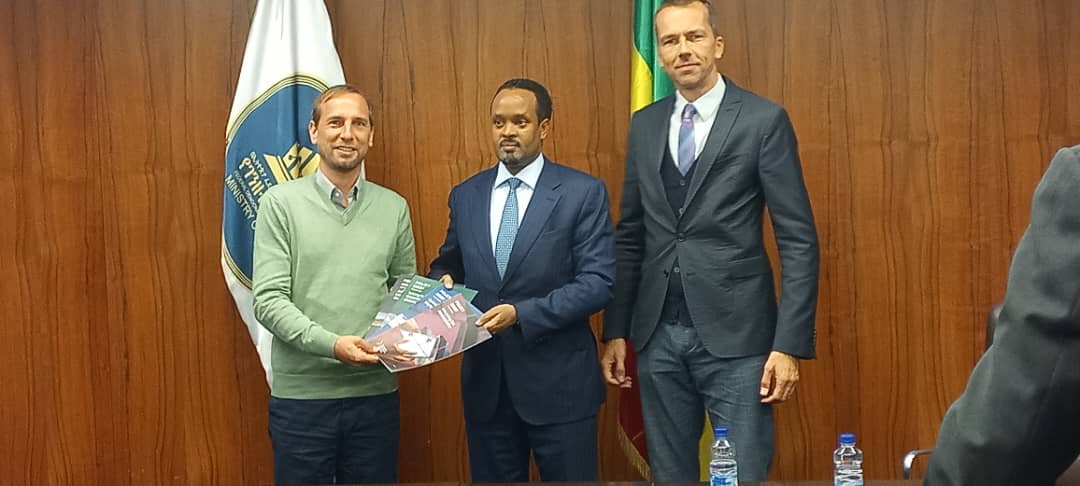
EuroCham and Ministry of Finance Hold Technical Meeting to Address Challenges Facing Foreign Direct Investment in Ethiopia
A technical meeting between the Ethiopian Ministry of Finance and representatives from the European Chamber in Ethiopia (EuroCham) and the European Union Delegation was held on July 24, 2024, aiming to address key challenges faced by European foreign direct investors in the country. The meeting was attended by H.E. Ahmed Shide, Minister of Finance, alongside senior officials from the Ministry and EuroCham Board members, including leaders from various sectors such as agriculture, logistics, and manufacturing.
The Minister opened the meeting by extending a warm welcome to the Charge d’affaires of the European Union Delegation to Ethiopia, Dr. David Krivanek. He acknowledged the EU’s role as a vital trade partner, emphasizing the significance of the ‘Everything But Arms’ (EBA) initiative, which allows Ethiopian goods to enter European markets tariff-free. He noted that Ethiopia’s exports to the EU reached EUR 688 million in 2023, marking a 40% increase over the last five years and that Europe collectively constitutes the largest and most consistent development partner.
Dr. David expressed appreciation for the opportunity to engage with the Ministry and highlighted the EU’s ongoing commitment to supporting Ethiopia amid various challenges. He pointed out that the EU remains the second largest trade partner for Ethiopia and a significant source of Foreign Direct Investment (FDI). However, he outlined persistent issues hindering investment, including limited access to foreign exchange, inconsistent customs valuations, and bureaucratic hurdles.
During his remarks, Ben Depraetere, Board Chair of EuroCham, outlined several key issues impacting the investment landscape for European companies operating in Ethiopia. Among the foremost challenges are difficulties related to customs valuation and tax assessment and audit challenges that European businesses encounter. It was pointed out that the current processes often lack transparency and consistency, creating uncertainty for investors. Furthermore EuroCham stressed that the current audit appeal procedure is problematic as companies are required to deposit 50% of the tax claim in case they want to appeal and a further 25% if further appeal is required. EuroCham highlighted that unfounded tax claims can severely strain company liquidity, potentially leading to business closures. This would have detrimental consequences for employment and sustainable revenue generation. Furthermore it may open doors for corruption with auditors seeking personal gains. The Minister responded that while everyone has a responsibility to contribute to revenue generation, it should not hinder legitimate businesses. The Minister invited EuroCham to propose suggestions and best practices on tax appeal procedures. EuroCham also highlighted challenges in accessing foreign loans due to the 5% interest rate cap.
Regarding VAT, the minister explained that the increase in VAT on consumer goods is part of the drive to increase the tax to GDP rate from its current 7% to 11% in 4 years time. He emphasized that the strategy is being implemented with a focus on protecting the poor. EuroCham noted that the recent VAT reforms have removed the exemption for animal feed and vegetable seedlings. This change will affect smallholder farmers and consumers as VAT will now be passed on to end consumers for animal products and vegetables. The Minister acknowledged the remarks and assured EuroCham that the matter would be investigated further.
Finally, EuroCham pointed out significant logistical challenges within Ethiopia’s coffee sector, emphasizing the need for improved infrastructure and support systems to facilitate smoother operations for foreign investors in this vital industry. This is particularly urgent given the impending EU Deforestation Regulation, which necessitates timely shipments. The Minister took note and expressed his commitment to address the booking and system issues related to ESLE and Ethiopian Railway Corporation with the Ministry of Transport and Logistics.
The Minister concluded by emphasizing that the issues raised affected not only European investors but also all foreign investors and local businesses. Hence addressing these topics will lead to improving the business climate for all.
The meeting served as a platform for open dialogue, with participants agreeing to systematically address these challenges to enhance the investment climate in Ethiopia. During the meeting, EuroCham handed a copy of its policy briefs on tax, customs, foreign exchange and land access to the Minister. EuroCham members expressed optimism about the potential for collaboration between the chamber and the Ministry of Finance, aiming to create a more conducive environment for European FDI in the country.
latest News
Is a Salary Raise the Answer to Rising Inflation?
October 22, 2024
The FX Regime Change in Ethiopia & Its Broader Implications
October 22, 2024
European Chamber in Ethiopia Welcomes Ethiopia’s FX Exchange Reforms

European Chamber in Ethiopia Welcomes Ethiopia’s FX Exchange Reforms
[Addis Ababa, August 9, 2024] – The European Chamber in Ethiopia (EuroCham) commends the Government of Ethiopia’s and the National Bank of Ethiopia’s (NBE) decision to introduce a market based exchange rate, eliminate the waiting list and priority ranking for foreign exchange (FX), lift import restrictions on numerous items and delegate more authority to commercial banks for FX management. EuroCham believes these bold reform measures will enhance transparency and predictability for businesses seeking FX access in the medium term as well as lead to an increased FX availability for the manufacturing and import-substitution sectors.
The reforms, seen as liberalizing and eliminating many of the regulatory restrictions that used to be in place, aim to significantly diminish the role of the parallel black market by attracting FX back into the formal market. The announced measures, therefore, have the potential to address long standing macroeconomic imbalances. The gap between formal and parallel markets has currently narrowed to a single digit. The current trend observed in the unification of the exchange rates would incentivize the commodity exporter as it allows to rectify the mismatch between the international commodity prices and the domestic prices as well as allow for exporting manufacturers to improve their liquidity position which had been eroded due to the overvaluation of the ETB, while most of the domestically purchased goods and services were already factoring in the black market rate. Attracting the FX back into the formal system would also stop the self-destruction of certain export sectors where exporters have been selling at a loss in order to sustain their import business where imported goods were sold at highly inflated margins to compensate for the sustained losses. Eurocham has observed that prices of agricultural commodities have seen unexplained price hikes over the past two weeks driven by profiteering brokers and middlemen. Unless this trend is countered, this will impact the effectiveness of the export incentives the directive had envisioned.EuroCham also observed price surges of goods in wholesale and retail and believes it will be important for the relevant authorities to address such behaviour, especially regarding traders and manufacturers holding stock and hoarding products. While inflation is to be expected from such reform, it will also be important that inflation is kept under control in order to protect the livelihoods of those on low and fixed incomes. While increased investment in the Productive Safety Net and the announced adjustment of the lowest salary brackets are intended to address the impact of inflation, they could exacerbate inflation if left unchecked.
For the reforms to be effective, a multistakeholder approach is required to ensure that FX inflows enter into the formal system through an attractive and transparent FX exchange system. While the new directive should offer the incentives for exporters and importers alike and for remittance from the diaspora to enter into the formal system, coordinated efforts between the Ministry of Revenue and Customs Commission will be required to stop the illicit flows, create a level playing field and take away the incentive of the unregulated trade that has been persisting for too long. Current observations indicate uncertainty in the trading environment with supply and demand for FX slowing down.
EuroCham also views the lifting of import restrictions on 38 items by the NBE as a positive development. However, the continued ban imposed on importing fuel powered vehicles remains a significant hurdle for the private sector, specifically for those investments operating in remote corners of the country without appropriate infrastructure for EVs. Similarly, while the removal of restrictions on Franco Valuta imports is anticipated for both businesses and individuals, bureaucratic challenges persist. Current customs restrictions on FV imports, even for essential spare parts and crucial inputs and raw materials for the manufacturing sector, are hindering the sector and contradict the announced reforms by NBE.
Ethiopia’s new foreign exchange regulations differentiate between inflows related to Foreign Direct Investment (FDI) and export proceeds. While FDI inflows can be fully retained in foreign currency, exporters must currently surrender 50% of their earnings at a freely negotiated exchange rate and can only retain the remaining 50% for a maximum of 30 days. While NBE has announced that both the retention rate and the retention period may be adjusted from time to time, EuroCham expresses concerns about the practicality of the mandatory surrender after 30 days, given the current lengthy global supply chains and the logistical challenges posed by the Red Sea crisis which hinder timely imports. This would necessitate extraordinary measures for businesses to align import schedules with export earnings in order to access their own export retention proceeds. Eurocham reiterates its viewpoint that FX retention rates for the export manufacturing sector (those who add value and require inputs) shall be higher compared to the FX retention rates of exporter traders
The regulations maintain restrictions on advance payments for imports, limiting them to $5,000. While the possibility of larger advance payments has been introduced and could be used as an alternative solution to overcome the challenges posed by the mandatory surrender of the retained export earnings after 30 days, it requires the submission of a foreign bank guarantee, thereby increasing complexity and costs for importers.
In addition to retaining half of their export earnings, exporters can now negotiate to repurchase the remaining portion from their banks at the prevailing selling rate. This flexibility is expected to alleviate foreign exchange shortages, potentially reduce costs for import-substitution manufacturers, and enable the utilization of their manufacturing capacity, which has been idle due to persistent FX shortages over the past years. The ability of exporters to freely use their own foreign exchange for purchasing goods and services within the same legal entity also marks a groundbreaking shift in Ethiopia’s economic landscape.
The directive now enables credit card payments and e-commerce for export activities, streamlining common international practices in trade processes. Additionally, expat workers can now transfer their net bonuses and pensions abroad, addressing a long-standing concern. Previously, only their monthly net salary could be remitted overseas.
Domestic companies involved in export, import substitution, road construction, or agriculture machinery can now obtain supplier credit in foreign currency. Other positive developments include the removal of interest rate ceilings on foreign loans, a long-standing demand from EuroCham as the former interest rate cap of 5% was no longer able to accommodate the growing global interest rates.
The new regulations allow big scale mining, public-private partnerships (PPPs), and strategic foreign direct investments (FDIs) to establish offshore accounts. It also introduces favorable conditions for Special Economic Zones (SEZs) and Industrial Parks (IPs). Companies operating within these zones can now invoice and settle payments in foreign currency amongst each other, enhancing operational efficiency and flexibility which is believed to promote value chain additions and cut back on import requirements.
Additionally, the authorization of forex exchange bureaus is a crucial step towards addressing the scarcity of foreign currency notes in the formal economy which will benefit outbound travelers. Some of the additional measures introduced to address the acute shortage of foreign currency that has plagued the banking system include requiring foreign visitors to pay for hotel and airline services in foreign currency, allowing employees of foreign companies and international organizations to open foreign exchange accounts with fewer restrictions, and promoting the use of foreign currency debit and credit cards within Ethiopia. Moreover, individuals can now purchase up to $5,000 or 10% of their account balance in foreign currency for travel abroad, a significant improvement over previous restrictions. These measures, together with a more unified exchange rate are expected to stimulate the inflow of FX into the formal market, including remittances originating from the diaspora community, and reduce the demand for black market exchange.
The new exchange regulations do not explicitly enforce the use of the Ethiopian Shipping and Logistics Service (ESL), allowing for potential future competition in the sector. While the Ministry of Transport and Logistics currently still retains control over the mandatory use of ESL, the directive leaves room for the eventual elimination of its monopoly.
On a different note, the regulation presents challenges for the floriculture sector. The persistence of minimum export prices for flowers, coupled with uncertainty over whether freight charges must be remitted on top of the FOB value, is creating significant difficulties for the industry. While the government retained the minimum export prices for flowers with the aim to control the mandatory remittance, these measures risk undermining Ethiopia’s competitiveness in the global flower market as Ethiopia is subject to global pricing. EuroCham is advocating for the complete removal of minimum export prices altogether so that exporters can compete freely in the global market.
The regulation allows foreign investors to purchase FX from commercial banks at the prevailing exchange rate to transfer shareholder earnings for future dividends. On the other hand, the new regulation establishes a tiered approach to backlogged dividend repatriations. These are dividend repatriations approved by NBE but not yet paid by banks before July 28, 2024, awaiting further clarification. As the unforeseen devaluation of the ETB is causing significant concerns among investors, wiping out about half of the accumulated backlogged shareholder earnings, it could lead to further erosion of shareholder value and confidence. EuroCham will continue to advocate for a more FDI friendly solution for the backlogged dividends.
Overall, the new directive consolidates previous regulations into a single document, providing greater clarity and transparency for businesses and prospective foreign investors leading to an improved business climate. EuroCham believes that the announced historical reforms could bring about a landslide change into the macro-economic landscape and address longstanding discrepancies allowing the free-floating exchange rate to address structural distortions. While EuroCham welcomes the FX regulatory reforms, the real impact is to be seen in the coming months once the market forces have settled and the FX reserves in the formal system have increased. The announced reforms will however only succeed if the relevant government stakeholders such as customs, tax authorities, trade regulators, security forces and NBE jointly crack down on illicit actors whereby the rule of law and peace and security shall prevail and anti-inflation measures are rapidly implemented.
latest News
Is a Salary Raise the Answer to Rising Inflation?
October 22, 2024
The FX Regime Change in Ethiopia & Its Broader Implications
October 22, 2024
ICS Introduces New Passport Fees
The Ethiopian Immigration and Citizenship Services (ICS) has implemented revised fees for passport services. Effective July 7, 2024, the standard fee for a new passport will be 5,000 Birr. An expedited passport service is now available for 25,000 Birr, ensuring delivery within two days. This premium option is designed to offer a more expeditious process for obtaining travel documentation to those who require it. For more information on the revised fees for travel documents, residence permit and other services, see the regulation published in the Federal Negarit Gazette below.
